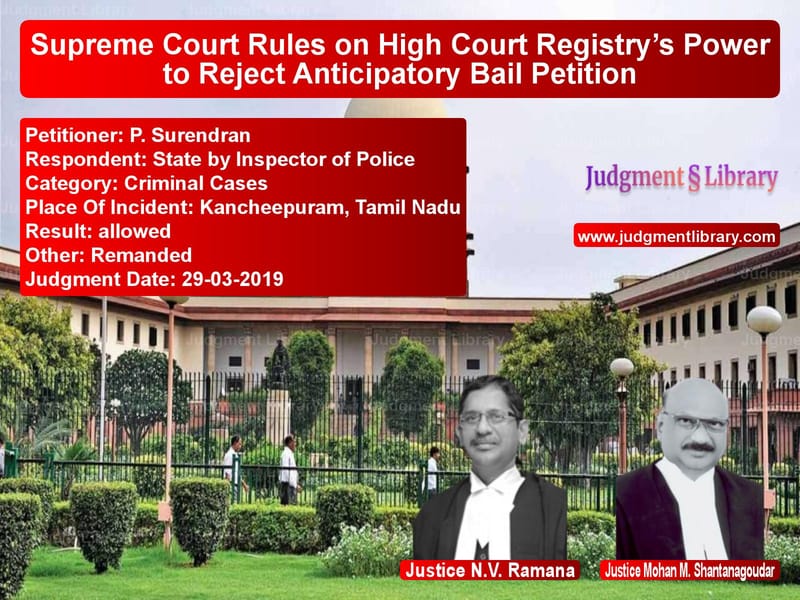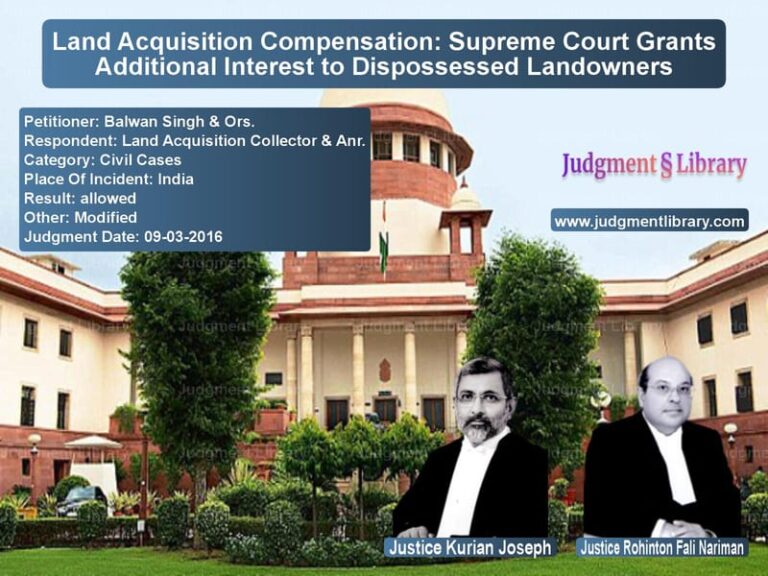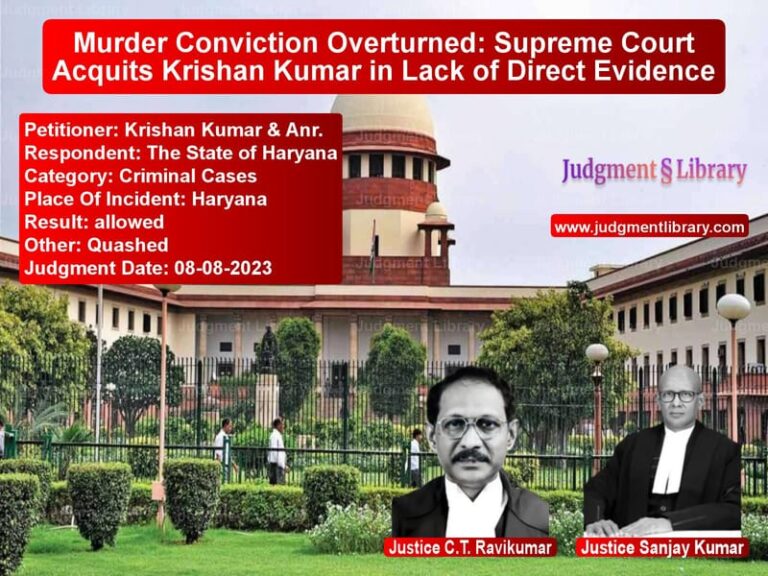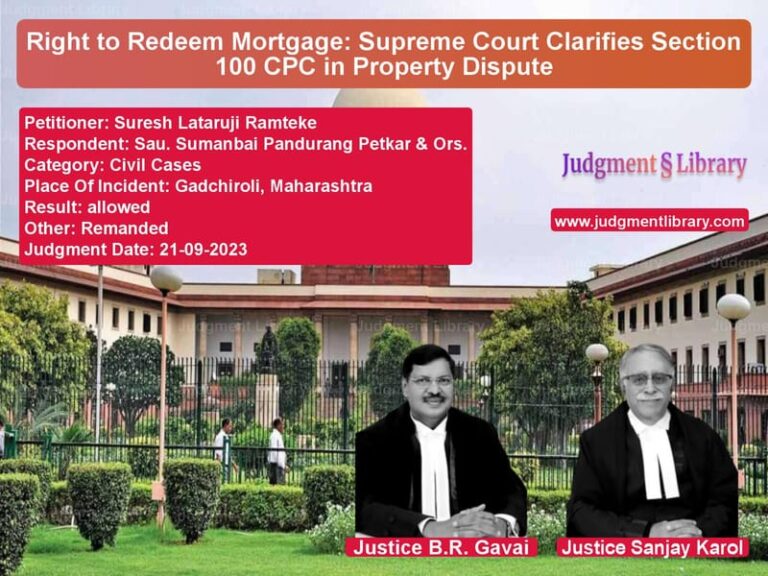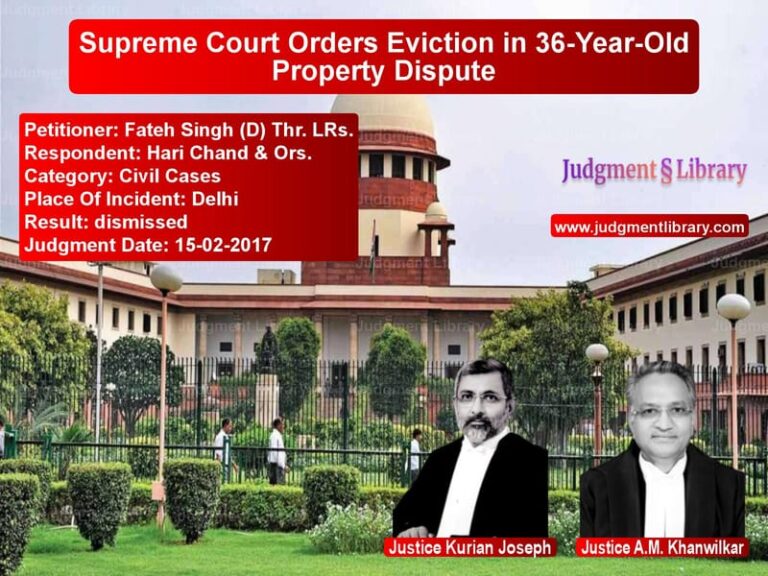Supreme Court Rules on High Court Registry’s Power to Reject Anticipatory Bail Petition
The Supreme Court of India, in the case of P. Surendran vs. State by Inspector of Police, addressed a crucial question regarding the authority of High Court Registries to reject anticipatory bail petitions. The case arose when the Madras High Court Registry refused to register and number an anticipatory bail petition on the grounds that it was not maintainable under the Scheduled Castes and Scheduled Tribes (Prevention of Atrocities) Act, 1989 (SC/ST Act).
The Supreme Court ruled that the rejection of an anticipatory bail petition by the High Court Registry was beyond its authority, as determining maintainability is a judicial function that must be decided by the appropriate bench.
Background of the Case
The case involved an FIR registered against multiple accused under Sections 147, 148, 448, 302, and 506 of the Indian Penal Code (IPC) and later under Section 3(ii) of the SC/ST Act. The petitioner, P. Surendran, was subsequently added as an accused in the case.
In fear of arrest, the petitioner filed an anticipatory bail application before the Principal Sessions Judge of Kancheepuram District, which was dismissed on 2 January 2019. Aggrieved by this, the petitioner approached the Madras High Court, but the Registry refused to number and list the petition on the following grounds:
“It may be stated how this petition for Anticipatory Bail is maintainable since the offence is under SC/ST Act.”
Despite responding to the Registry’s objection, the petitioner’s anticipatory bail petition was dismissed on the grounds of maintainability.
Key Legal Issues
The Supreme Court was called upon to decide the following:
- Whether the High Court Registry had the power to reject the numbering of an anticipatory bail petition.
- Whether the dismissal of the anticipatory bail petition on maintainability grounds affected the petitioner’s right to judicial adjudication.
- Whether the introduction of Section 18A under the SC/ST Act altered the maintainability of anticipatory bail petitions.
Petitioner’s Arguments (P. Surendran)
The petitioner contended:
- The Registry’s rejection of his petition without listing it before a bench violated his fundamental right to access justice.
- The question of maintainability under the SC/ST Act required judicial determination, not administrative rejection by the Registry.
- Section 18A of the SC/ST Act, introduced by the 2018 amendment, does not automatically bar courts from hearing anticipatory bail petitions.
- The Attorney General for India had previously stated that anticipatory bail should not be outrightly denied in cases under the SC/ST Act, as held in Union of India vs. State of Maharashtra.
Respondent’s Arguments (State)
The State opposed the petition, arguing:
- The 2018 amendment to the SC/ST Act, particularly Section 18A, barred anticipatory bail for accused persons under this law.
- The Registry was correct in refusing to register the petition since the High Court could not grant anticipatory bail in such cases.
- The petitioner failed to establish any legal basis for bypassing the restrictions imposed by the SC/ST Act.
Supreme Court’s Observations
The Supreme Court rejected the State’s arguments and held that:
“The act of numbering a petition is purely administrative. The Registry of the Madras High Court overstepped its authority by determining the maintainability of the petition, a function that is exclusively judicial.”
The Court emphasized:
“Maintainability issues must be decided by an appropriate judicial bench, not by a court registry acting in an administrative capacity.”
The Court referred to the Constitution Bench ruling in Jaswant Sugar Mills Ltd. vs. Lakshmichand & Ors., which defined judicial functions, and noted that:
“Determination of whether an anticipatory bail petition is maintainable under the SC/ST Act involves legal reasoning and cannot be dismissed by a court registry on procedural grounds.”
Final Judgment
The Supreme Court ruled as follows:
- The Madras High Court Registry had no authority to reject the petition based on maintainability.
- The petition must be numbered and listed before an appropriate judicial bench.
- The issue of maintainability under Section 18A of the SC/ST Act must be decided by the High Court, not its administrative office.
The Court concluded:
“The Registry’s decision amounts to encroachment on judicial functions. It is a fundamental principle of law that questions of maintainability must be adjudicated by the judiciary, not administrative staff.”
Implications of the Verdict
This ruling has significant implications for judicial procedures and the rights of accused individuals:
- Clear Separation of Judicial and Administrative Functions: High Court Registries cannot determine the maintainability of cases, ensuring that litigants have access to proper judicial review.
- Due Process for Accused Persons: The ruling safeguards the rights of accused individuals to seek judicial recourse, even in cases involving special laws like the SC/ST Act.
- Guidance for High Courts: The decision sets a precedent that all High Courts must adhere to procedural fairness when handling anticipatory bail petitions.
- Judicial Oversight Over SC/ST Act Applications: The ruling clarifies that blanket bans on anticipatory bail require careful judicial interpretation rather than outright administrative rejection.
By reinforcing the role of the judiciary in determining legal questions, this Supreme Court judgment strengthens procedural fairness and access to justice in India.
Petitioner Name: P. Surendran.Respondent Name: State by Inspector of Police.Judgment By: Justice N.V. Ramana, Justice Mohan M. Shantanagoudar.Place Of Incident: Kancheepuram, Tamil Nadu.Judgment Date: 29-03-2019.
Don’t miss out on the full details! Download the complete judgment in PDF format below and gain valuable insights instantly!
Download Judgment: P. Surendran vs State by Inspector o Supreme Court of India Judgment Dated 29-03-2019.pdf
Direct Downlaod Judgment: Direct downlaod this Judgment
See all petitions in Bail and Anticipatory Bail
See all petitions in SC/ST Act Case
See all petitions in Judgment by N.V. Ramana
See all petitions in Judgment by Mohan M. Shantanagoudar
See all petitions in allowed
See all petitions in Remanded
See all petitions in supreme court of India judgments March 2019
See all petitions in 2019 judgments
See all posts in Criminal Cases Category
See all allowed petitions in Criminal Cases Category
See all Dismissed petitions in Criminal Cases Category
See all partially allowed petitions in Criminal Cases Category

